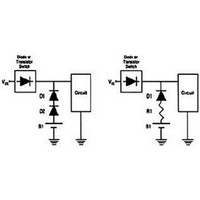BR1225 RAYOVAC, BR1225 Datasheet - Page 3

BR1225
Manufacturer Part Number
BR1225
Description
LITHIUM BATTERY, 3V, COIN CELL
Manufacturer
RAYOVAC
Datasheet
1.BR1225.pdf
(26 pages)
Specifications of BR1225
Battery Size Code
Coin Cell
Battery Capacity
50mAh
Battery Voltage
3V
Battery Technology
Lithium
Battery Terminals
Pressure Contact
External Diameter
12.5mm
External Height
2.5mm
Lead Free Status / RoHS Status
na
Available stocks
Company
Part Number
Manufacturer
Quantity
Price
Company:
Part Number:
BR1225
Manufacturer:
MAXWELL
Quantity:
4 000
Company:
Part Number:
BR1225-1VC
Manufacturer:
STANLEY
Quantity:
3 000
Company:
Part Number:
BR1225/1HC
Manufacturer:
SMSC
Quantity:
3 000
Company:
Part Number:
BR1225/H1A
Manufacturer:
TAIYO
Quantity:
4 000
Company:
Part Number:
BR1225A/HBN
Manufacturer:
Panasonic
Quantity:
4 000
VII. Calculating Battery Life
The design of an electronic circuit powered by a
component class battery requires the designer to
consider two interacting paths that determine a
battery’s life: consumption of active electro-
chemical components and thermal wear-out.
To optimize battery life in powered devices, today’s
designers are first selecting power conserving
circuit components, and then specifying high
reliability component Lithium batteries. Battery
selection is based on an understanding of the
thermal capabilities, effects of the operating
environment, and the battery life requirements of
the powered device.
Figure 1, at right, gives an estimate of years of
service at various discharge currents for BR
Lithium coin cells at room temperatures.
Consumption of Active Battery Components
Batteries produce electrical current by oxidation
and reduction of their active electrochemical
components. Once these components are
consumed, the battery ceases to produce current.
The sum of the energy consumed by the circuit
over its expected life plus the electrochemistry’s
inherent loss of energy due to self-discharge,
represents the first path in determining battery life.
Thermal Wear-Out
The second path in determining battery life is
thermal wear-out, which is the loss of capacity
caused by thermal mechanisms. Generally, thermal
wear-out rates accelerate as temperatures in the
operating environment rise.
It is very important to hold the paths of self-
discharge and thermal wear-out as separate issues.
This is because self-discharge can sometimes be
compensated for by increasing the specified
battery capacity, while thermal wear-out can only
be addressed by selecting a more thermally
capable battery.
3
Battery Life and Capacity Estimates
Rayovac has accumulated over 200 million device
hours of accelerated reliability testing with a major
semiconductor manufacturer. This data has
allowed us to gain a better understanding of the
time and temperature dependent wear-out of BR
Lithium coin cells and FB batteries during storage.
Please contact Rayovac's OEM Division for more
information.
0.4
20
10
1
0.1
BR2325
Discharge Current (µA)
Drain vs. Duration
BR1225
1
Figure 1
10
BR2335
BR2032
BR1632
100



















